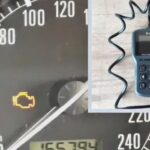The ZUS Smart Vehicle Health Monitor Mini (Gen 4) has been making waves in the car accessory market, promising to turn your smartphone into a powerful car diagnostic tool. Marketed as a “FREE” device, it certainly grabs attention. But beyond the enticing price tag and sleek app, what are you really getting? As a car enthusiast and content creator for carparteu.com, I decided to delve into a hands-on review to see if the ZUS OBD2 monitor lives up to the hype, or if it’s just another data-harvesting gadget disguised as a helpful tool.
First impressions are important, and in the case of the ZUS OBD2 monitor, the device itself feels well-made, and the accompanying app is undeniably polished and user-friendly. Features like the battery health monitor and driving efficiency analysis are genuinely useful and add value to the driving experience. It’s easy to see the appeal of having real-time data about your car’s performance at your fingertips.
Alt text: ZUS OBD2 Mini adapter plugged into a car’s OBD2 port, ready for vehicle diagnostics and health monitoring.
However, the initial excitement starts to wane when you scratch beneath the surface of their “FREE” marketing campaign. The device is advertised as free, a strong hook to lure in customers. But as you proceed through the checkout process, you quickly realize that “free” actually means “heavily discounted,” as you’re slapped with a substantial shipping fee. In my case, the shipping cost exceeded $19, significantly more than the actual postage would likely be. This tactic feels disingenuous. It gives the impression that the inflated shipping cost is designed to recoup the device’s actual price, blurring the lines of honest marketing. It’s a classic case of “bait-and-switch” marketing that leaves a sour taste.
Alt text: ZUS app dashboard displaying vehicle battery health information and driving efficiency analysis graphs.
Furthermore, the “free” offer comes with strings attached, particularly concerning refunds. Since you technically paid nothing for the device itself, only the shipping, you’re essentially forfeiting any chance of a refund on the total cost should you be dissatisfied. This lack of transparency is concerning and raises questions about the company’s confidence in their product.
Adding to the marketing skepticism is their referral program. Offering a $10 incentive for each friend you refer to claim their “FREE” ZUS device raises eyebrows. If the device is truly free, where is the budget for these referral bonuses coming from? It suggests that the actual cost of the device is built into another part of their business model, hinting at the real value exchange.
Alt text: ZUS mobile application screen prompting user to enter Vehicle Identification Number (VIN) for advanced car monitoring features.
This brings us to the most significant concern: data harvesting. Like many tech companies today, ZUS operates on a data-driven model. While the app offers valuable features, it also collects a substantial amount of your data. This includes your car’s VIN (optional, but encouraged), make, model, year, driving routes, car error codes, and driving behavior. Even if anonymized, this data is valuable for market research, targeted advertising, and potentially selling to third parties. While data collection is commonplace, the lack of a clear opt-out for data analysis, even for paying subscribers, is a significant drawback. Users should have more control over their data and how it’s used.
The user interface, while generally well-designed, also has its quirks. The main dashboard prominently displays a large graphic of four wheels, seemingly advertising their tire pressure monitoring system, even if you don’t use that feature. This feels like screen real estate wasted on advertising, pushing users towards a subscription-based dashboard if they want a cleaner view. It’s reminiscent of “ad-supported” software tactics, which feels out of place in a car diagnostic tool.
Alt text: ZUS app main dashboard interface highlighting tire pressure monitoring feature alongside vehicle health data.
Finally, for European users, it’s worth noting that while ZUS claims GDPR compliance, their primary focus appears to be the US market and CCPA regulations. While GDPR compliance is positive, European users should still be mindful of their data privacy rights and how their data is being handled.
In conclusion, the ZUS OBD2 Smart Vehicle Health Monitor Mini (Gen 4) is a functional product with a well-designed app that offers genuinely useful features. However, the questionable “FREE” marketing strategy, lack of transparency regarding shipping costs, and aggressive data collection practices are significant drawbacks. If you are comfortable with sharing your driving data and can overlook the marketing tactics, the ZUS OBD2 can be a helpful tool. However, for users concerned about data privacy or prefer more upfront marketing, exploring alternatives like a standard ELM327 OBD-II adapter combined with apps like Torque Pro might be a more transparent and privacy-conscious option, often at a similar overall price point without recurring subscriptions and extensive data sharing.
Date of Experience: April 29, 2021 (as per original review – keeping consistency)
